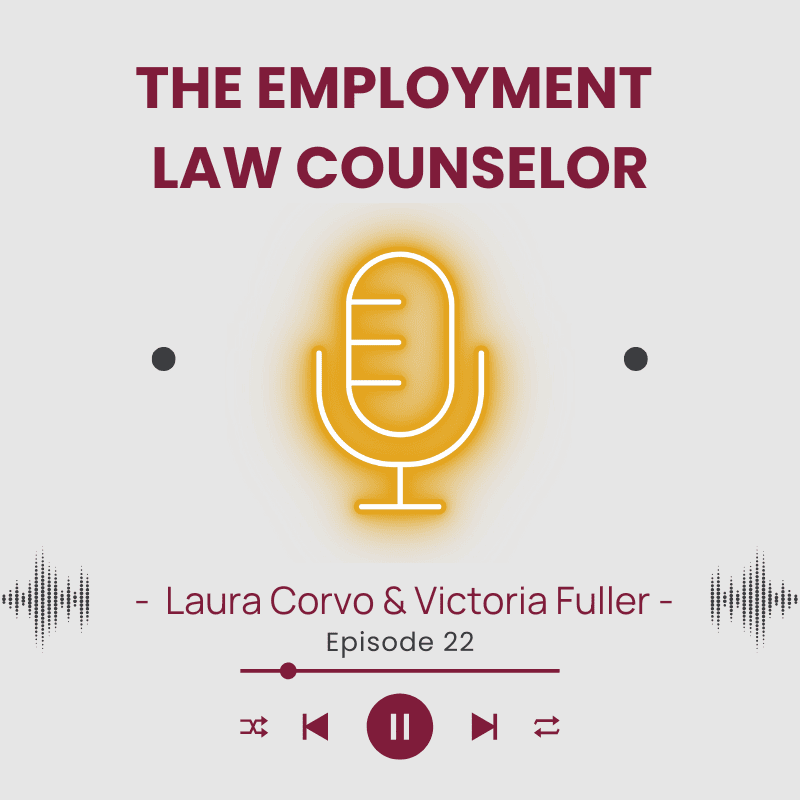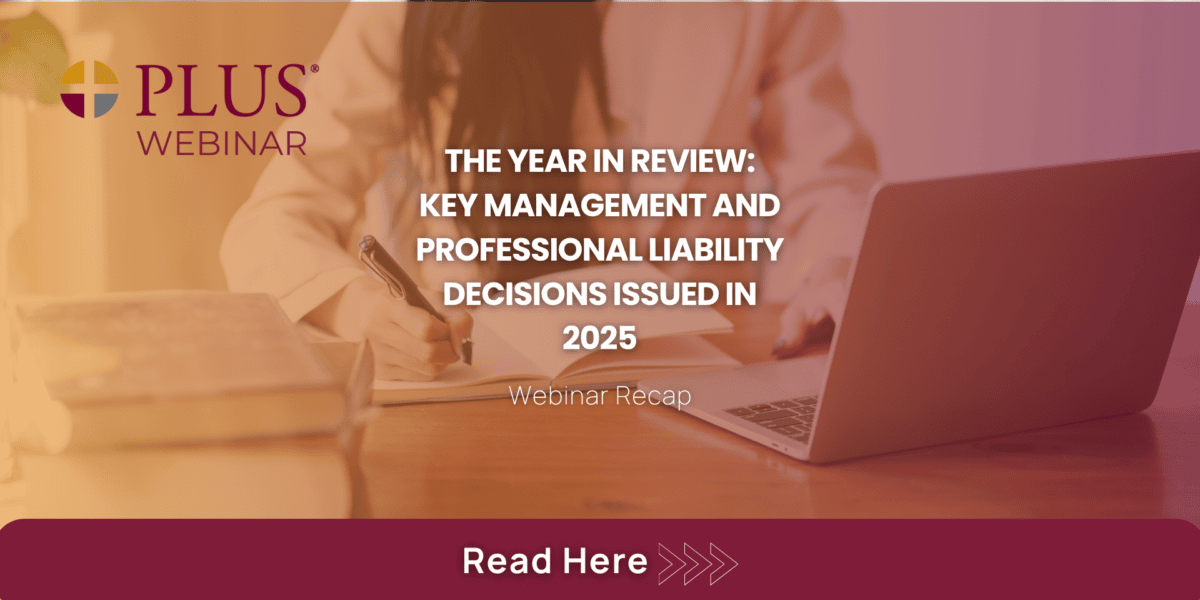October 29, 2025
AI Generates a New Workplace: Legal Risks, Regulations, and Practical Guidance from The Employment Law Counselor

Artificial Intelligence (AI) is rapidly reshaping today’s workplace, unlocking new possibilities while also introducing complex legal challenges. In the most recent episode of The Employment Law Counselor, hosts Victoria Fuller and Laura Corvo, joined by guest Victoria Ranieri, dive deep into the evolving landscape of AI in employment. They explore how employers are leveraging AI, the emerging legal and regulatory risks, and the critical steps organizations must take to protect themselves in this rapidly changing environment.
Understanding the Rapid Evolution and Types of AI
The episode opens with an overview of the different types of AI technologies now present in the workplace. From generative AI to deep learning, natural language processing, and agentic AI, the hosts explain how these tools simulate—but do not replace—human intelligence. The discussion emphasizes that while AI can automate tasks like resume screening, performance evaluations, and even drafting legal documents, it is essential to remember that these systems operate based on data and algorithms, not human judgment.
Legal and Regulatory Risks in Employment Decisions
A major focus of the episode is the legal minefield employers face when using AI for HR functions. The hosts highlight recent cases and new regulations at the state and local levels, such as New York City’s bias audit requirements and California’s record-keeping mandates. They discuss how AI tools can inadvertently perpetuate discrimination, leading to class action lawsuits and regulatory scrutiny. The conversation underscores the importance of understanding both the intended and unintended consequences of AI-driven employment decisions, and the need for ongoing legal counsel to navigate this evolving landscape.
Confidentiality, Cybersecurity, and Intellectual Property Concerns
Beyond discrimination risks, the episode explores the broader implications of AI use, including confidentiality breaches, cybersecurity threats, and intellectual property (IP) issues. Real-world examples are used to illustrate how sensitive data can be exposed through AI-powered note-taking tools or how AI-generated outputs might infringe on copyrights or trademarks. The hosts stress the importance of robust data privacy protocols, employee training, and careful vetting of AI vendors to mitigate these risks.
Best Practices: Policies, Training, and Insurance
To help employers minimize their exposure, this episode offers practical guidance on developing and implementing AI use policies. This includes collaborating with HR and IT teams, restricting the use of public AI tools, and ensuring human oversight of AI outputs. The hosts also recommend regular employee training, transparency in AI use, and maintaining up-to-date insurance coverage that specifically addresses algorithmic risks. They caution against relying on AI to draft critical policies or legal documents, advocating instead for professional legal advice.
Why This Episode Matters for Professional Liability Practitioners
This episode is essential for professional liability practitioners because it highlights the intersection of emerging technology and legal risk. As AI becomes more integrated into employment practices, the potential for liability—whether from discrimination claims, data breaches, or IP disputes—grows exponentially. Practitioners must stay informed about the latest regulatory developments, advise clients on best practices, and ensure that insurance policies and risk management strategies are adapted to address the unique challenges posed by AI. The insights from this episode equip professionals to better counsel their clients and proactively mitigate the risks associated with AI in the workplace.
Interested in learning more about this topic? Listen to the full episode here.
Meet the Speakers

Laura Corvo serves as Counsel at White and Williams. She represents employers in employment litigation and counsels clients on a variety of employment-related issues. She has extensive knowledge of federal, state and local employment laws and regularly counsels employers on a host of personnel and human resource issues including, employee hiring, discipline and termination matters, reductions in force, wage and hour compliance, family and medical leave compliance, and managing accommodations for disabled employees. Laura frequently conducts harassment and discrimination investigations and provides training to executives, managers and employees on a range of topics including anti-harassment, anti-discrimination and diversity. She also drafts and reviews employment contracts, employee handbooks and other personnel policies. Laura represents employers in litigation involving claims of discrimination, harassment and retaliation in federal and state courts and before various administrative agencies. She is also experienced in the litigation of business tort matters involving non-compete and other restrictive covenant agreements.

Victoria Fuller is a Partner and Co-Chair of the Labor and Employment Practice Group. She practices out of White and Williams’ Boston office. Victoria has over 17 years of experience as a civil litigator, focusing on employment litigation and counseling, higher education litigation, insurance coverage and bad faith litigation. Victoria is well-known for her creativity, commitment, efficiency and strategic focus with clients. Victoria regularly represents businesses, educational institutions, and non-profits in employment litigation pending in the EEOC, MCAD, as well as in Massachusetts state and Federal Court. In addition, she counsels employers with respect to a variety of employment matters including hiring, termination (including RIFs), requests for accommodation, policies and procedures, and restrictive covenants. In addition to employment matters, Victoria also defends educational institutions in legal disputes with students. Victoria also represents insurers in complex coverage and bad faith disputes and handles first party property coverage matters.

Victoria Ranieri is an Associate in the Commercial Litigation Department at White and Williams, based in the Boston office. She is a member of the Labor and Employment, Higher Education, and Insurance Coverage and Bad Faith practice groups. Victoria brings a strategic, solutions-oriented approach to helping employers navigate complex workplace issues. She regularly defends businesses and educational institutions in proceedings before the Massachusetts Commission Against Discrimination and EEOC, as well as in state and federal courts. Victoria has extensive trial experience, serving as lead counsel in dozens of jury trials. Beyond litigation, Victoria counsels employers on a variety of issues including development of policies and procedures, employee discipline and termination, and requests for accommodation. Victoria also represents educational institutions in disputes with students, including breach of contract and discrimination claims, and advises insurers in coverage and bad faith litigation.
News Type
PLUS Blog, Recap
Business Line
Employment Practices Liability (EPL)
Topic
Artificial Intelligence, Professional Liability (PL) Insurance
Contribute to
PLUS Blog
Contribute your thoughts to the PLUS Membership consisting of 45,000+ Professional Liability Practitioners.
Related Podcasts

The Employment Law Counselor Episode 22
Navigating Labor and Employment Challenges During the Holiday Season Happy Holidays from…
Related Articles

The Year in Review: Key Management and Professional Liability Decisions Issued in 2025 Webinar Recap
In our most recent webinar, panelists discussed recent court decisions that are…

Getting an A in Insurance: Analyzing Antitrust, Admissions, Athletics, and other D&O Issues in Higher Education Webinar Recap
During our most recent PLUS webinar, industry professionals came together to discuss…

Navigating Holiday Season Hazards: Essential Insights from The Employment Law Counselor
The latest episode of The Employment Law Counselor podcast delivers a timely…
